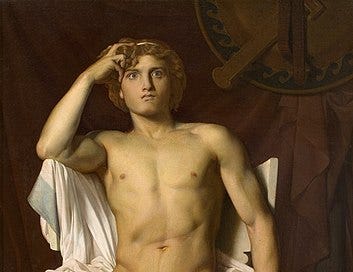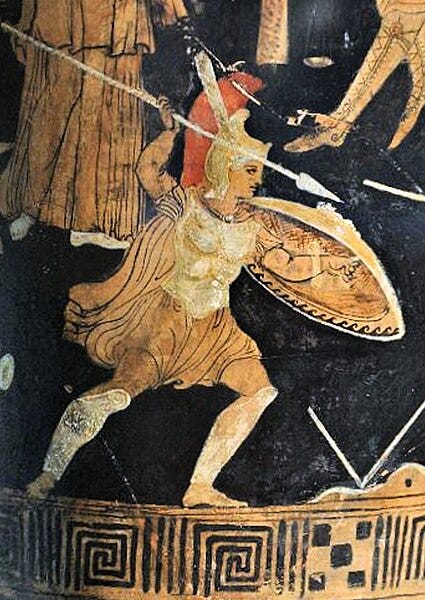The first book of the Iliad is often a surprise to raiders who come to it from general knowledge of myth. It not really about the Trojan War. It is a narrative set in a Trojan War that sets up surprising inversions and initiates a plot that advances some kind of a plan (be it cosmic and about the end of the race of Heroes, or local, and really about honoring Achilles by harming the Trojans). As I discuss in an earlier post the beginning of the Iliad contains thematically resonant language that engages with the larger poetic tradition while also informing audiences what to expect from this poem.
The introduction—called a ‘proem’ by classical scholars—does most of the work to set you on your way. It announces the them (Achilles’ rage), what it does (kill people) but with a twist (it kills Achaeans). All of this is framed as being part of Zeus’ plan. The cause of the rage, in this story, is a fall out between Achilles and Agamemnon, a “strife” (eris) that threatens to undermine the whole war effort.
When authors in antiquity talk about “The Rage of Achilles” as a narrative, I think we too often assume that their story is the same as ours. But even in the Iliad Achilles rages for different reasons: first at Agamemnon, then at Hektor for the death of Patroklos. We also know that in other traditions he raged over the death of Nestor’s son Antilochus and that multiforms of the beginning of our poem variously list as themes the rage of Apollo or the ‘rages’ of Apollo and Achilles. My point in bringing this up, is that we can’t assume that every story about Achilles’ rage was political in nature—our Iliad may very well be a particular variation on that theme, one that resonated with audiences for whom the political wrangling of the aristocracy was of particular interest. (Or, perhaps, political posturing among cities, etc.)
For me, the most influential account of Achilles’ rage is my Greek teacher’s book The Anger of Achilles: Menis in Greek Epic, which explains in part that Menis signals a rage reserved for divine figures over cosmic disorder. (For a complementary treatment of different words for Anger in the Homeric poems, see Thomas Walsh’s Fighting Words and Feuding Words: Anger and the Homeric Poems.) Two recent and important books should be read as supplements for this. Emily Austin’s Grief and the Hero explores how longing, absence, and grief are critical corollaries for rage, while Rachel Lesser’s Desire in the Iliad details how desire pervades the fabric of epic poetry and motivates its characters.
In my post on major themes for reading the Iliad, I offer five threads to follow in the epic: (1) Politics, (2) Heroism; (3) Gods and Humans; (4) Family & Friends; (5) Narrative Traditions. Book 1 gives us a start for each of these, but is entangled the most with the theme of politics. Everything about the conflict between Achilles and Agamemnon in book 1 is embroiled in political questions: who is in charge, who gets to authorize an action, who runs the assembly, who cares for the people, and the risk posed to their collective health and mission by leaders who put their own interests ahead of others.'
Despite the clarity of these questions, there was a long time when scholars argued you couldn’t talk about politics in Homer. That has really changed over the past generation or so. (Full disclosure, I wrote my dissertation on Politics and rhetoric in the Iliad.) Walter Donlan and Dean Hammer really paved the way for later scholars like Elton Barker and David Elmer to argue that the Iliad functions in part as a way to establish political institutions (and make room for dissent) and also to show the importance of public assent and the appearance of shared decision making. My small addition to this is that the political themes of the Iliad are explored on three stages with contrasting uses of language and power: first, the Achaeans, then the gods, and finally the Trojans.
The poem starts with a plot convention that entangles the worlds of gods and men, a plague. But the plague, rather than being part of the cosmic plan, is set into motion by human activity to which the gods respond. Plagues themselves in the ancient world are contexts for political crises to be explored.
Below I have provided a bibliography for politics in the Iliad. I will return to it in critical books. For now, I have provided some guiding questions as you think or teach about Iliad 1. I find it useful not to have too many questions, just some basic frameworks for beginning a conversation. Don’t forget that I have a post with practical advice for reading and teaching Homer. If you have other questions or additional bibliography to add, don’t hesitate to reach out. I have selected questions I find effective in preparing students for subsequent books and following the specific thematic threads.
Some guiding questions
What is Zeus' plan?
What’s the first mistake?
How do the Achaeans respond to the debate?
What are the political dynamics of the conflict between Agamemnon and Achilles?
What does Achilles' really ask Zeus for?
A short Bibliography on Politics in the Iliad
Barker E. T. E. 2004. “Achilles’ Last Stand: Institutionalising Dissent in Homer’s Iliad.” Proceedings of the Cambridge Philological Society: 92–120.
———. 2009. Entering the Agon: Dissent and Authority in Homer, Historiography and Tragedy. Oxford.
Chaston, C. 2002. “Three Models of Authority in the Odyssey.” The Classical World 96: 3–19.
Christensen, Joel P. 2015. “Trojan Politics and the Assemblies of Iliad 7.”
Greek, Roman and Byzantine Studies 55:25–51.
Cook, Erwin. 1999. “ ‘Active’ and ‘Passive’ Heroics in the Odyssey.” Classical
World 93:149–67.
Donlan, W. 1979. “The Structure of Authority in the Iliad.” Arethusa 12:51–70.
———. 2002. “Achilles the Ally.” Arethusa 35:155–172.
Elmer, D. 2013. The Poetics of Consent: Collective Decision-Making and the Iliad. Baltimore.
Hammer, D. 1997. “‘Who Shall Readily Obey?’ Authority and Politics in the Iliad.” Phoenix 51:1–24.
———. 2002. The Iliad as Politics: The Performance of Political Thought. Norman.
Haubold, J. 2000. Homer’s People: Epic Poetry and Social Formation. Cambridge.
Mackie, H. 1996. Talking Trojan: Speech and Community in the Iliad. Lanham.
Postlethwaite, N. 1998. “Thersites in the Iliad.” In Homer: Greek and Roman Studies, ed. I. McAuslan and P. Walcot, 83–95. Oxford.
Roisman, H. 2005. “Nestor the Good Counsellor.” The Classical Quarterly 55: 17–38.
Rose, P.W. 1997. “Ideology in the Iliad: Polis, Basileus, Theoi.” Arethusa 30:151–199.
Thalmann, W. G. 1988. “Thersites: Comedy, Scapegoats and Heroic Ideology in the Iliad.” Transactions of the American Philological Association 118:1–28.
———. 2004. “The Most Divinely Approved and Political Discord.” Classical Antiquity 23:359–399.
Wilson, D. F. 2002a. Ransom, Revenge and Heroic Identity in the Iliad. Cambridge.






Hi thanks google let me find your blog here, i am a student in Asia, struggling for the essay about Iliad. I really like the way you bring out all the important event happened in the iliad with such intersting point of view. you let me want to read more about Homer. The essay is not just a homework anymore, thanks a lot.
I'm a student writing a research paper, could someone help me cite this in MLA, and give me the URL or DOI?